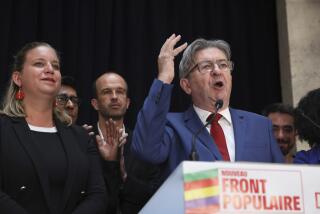Portugal’s Parliamentary Elections Deal Severe Blow to Soares’ Presidential Hope
LISBON — The voters of Portugal dealt a severe blow Sunday to the presidential hopes of Prime Minister Mario Soares by knocking his Socialist Party out of its position as the leading party in the Portuguese Parliament.
But the election returns left the Portuguese political situation in confusion. The centrist Social Democratic Party, which edged out the Socialists, did not win enough seats to take sole control of Parliament, called the Assembly of the Republic. Intense maneuvering and bargaining must now take place to determine the makeup of a coalition to run the assembly.
But President Antonio Ramalho Eanes--who may have done more than anyone else to ensure the defeat of the Socialists--is sure to ask Anibal Cavaco Silva, 45, the leader of the Social Democrats, to try to form a government and serve as prime minister.
Followers of Eanes, a 50-year-old former general who cannot run again in the next presidential elections in January, organized a new party, the Democratic Renewal Party, to contest the parliamentary elections.
Wife Campaigned for Eanes
While Eanes is forbidden by law from electioneering while serving as president, his wife, Manuela, campaigned hard throughout the country for the new party, and there was little doubt in the minds of voters that this was the Eanes party. The new party cut deeply into the traditional vote of the Socialists.
For Soares, a dominant politician since the Portuguese revolution of 1974, the returns were full of foreboding.
Soares did not officially lead his party in this parliamentary election, since he intends to run for the presidency in January. Voters were told that his close colleague, Antonio de Almeida Santos, would take over as prime minister if the Socialists won control of the Parliament.
But Socialist posters featured photos of Soares, pronouncing him the ideal candidate for president. His image has definitely been tarnished by the mediocre showing of his party.
That probably does not displease President Eanes, who clashed many times in the past with Soares under the Portuguese system that divides powers between the president and prime minister in ambiguous ways. And it seems obvious in Portugal that Eanes would prefer someone besides Soares to succeed him as president.
With nearly complete returns, the vote was divided this way: Social Democrats 29.9%, Socialists 20.7%, the Eanes party 17.9%, Communists 15.5%, Christian Democrats 9.8%. Various smaller parties divided the rest of vote.
With 210 of the 250 seats in Parliament decided through a complicated proportional representation system, the government said the Social Democrats had 77 seats, the Socialists 45, the Eanes party 38, the Communists 31 and Christian Democrats 19.
Provoked Election
For Cavaco Silva, the expected new prime minister, the election returns, at least on first glance, seem a vindication of an unpopular political step that he took last June. Cavaco Silva, fed up with what he called the extreme leftist policies of Soares, walked out of their two-year coalition in Parliament, forcing parliamentary elections at a time when everyone wanted to concentrate on the presidential elections.
The victory, however, could prove Pyrrhic, for Cavaco Silva may find it far more difficult to govern with the present divisions than even Soares did with the previous parliamentary split.
For Soares, the anti-Socialist vote obviously reflected dissatisfaction as well with his austerity policies, which have resulted in increased unemployment and a cut in wages for most workers.
The confused political situation could dishearten many Portuguese who have been unable to put together lasting governments for most of the 11 years since the army’s revolution toppled one of the most enduring 20th-Century dictatorships in Europe.
More to Read
Sign up for Essential California
The most important California stories and recommendations in your inbox every morning.
You may occasionally receive promotional content from the Los Angeles Times.










